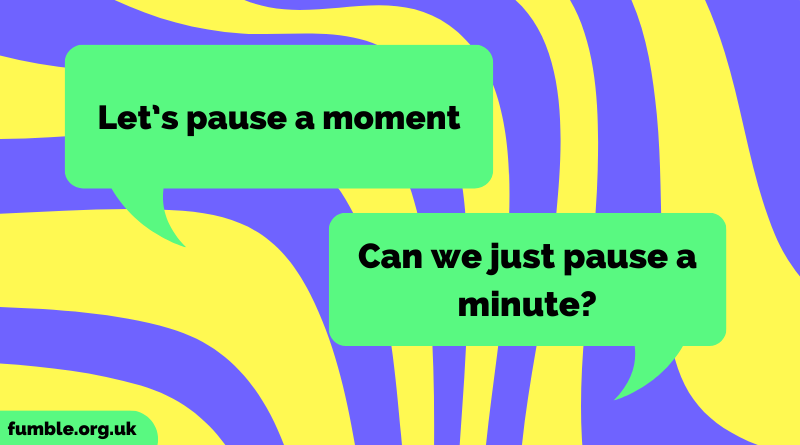It can feel hard to say a direct ‘no’, so let’s look at some alternatives
You can say ‘no’ to sex at any point. We can’t say it enough. Whether that’s in a club, your bedroom, or if you’re in the middle of having sex. You always have the right to change your mind about any kind of sexual intimacy, regardless of what’s going on. But even if we know that, it doesn’t mean it’s easy to actually say it. Saying no can feel incredibly hard for a lot of us! Especially if it involves someone we have feelings for or care about.
Jump straight to our Getting help section below if you want to access support around any experiences of sexual violence and unwanted sexual behaviour.
Despite the common idea that sexual consent is about saying a simple yes or no, it often feels much more complicated than that. We all have different communication preferences, just like we all have different sexual desires and boundaries. How we communicate is a very individual experience. Some people are great at saying an outright ‘no’, but a lot of people aren’t.
Because of this, it’s worth taking a beat to think about how you and your partner prefer to communicate. Just because you have the skills to be direct, honest and say ‘no’ when you need to (and it definitely counts as a skill!), doesn’t mean people around you have. Talking to your partner about how they prefer to say (or signal with our body language) ‘no’ can sound a bit over the top, but it’s a great way to understand each other more and feel comfortable with each other.
If you’re finding it tricky to say ‘no’, that’s okay! We’ve put together some alternatives that might feel a little easier, though this list certainly isn’t exhaustive. Some examples are phrased as questions, because they can sometimes feel easier to say. But, just because it’s a question, doesn’t mean it can be ignored. A lot of these examples are also phrased in a more ‘gentle’ way, which (again) can often feel easier to voice. If you can be more direct than this, that’s great! It really is a skill and, like any skill, practice helps a lot.
Here are some ways of saying ‘no’ that might feel a little easier:
1. Giving an alternative
Rather than a direct refusal, sometimes it can feel easier to suggest what you do want to do. For example: “Let’s do … instead” or “Can we do … instead?” This communicates to the other person that you want to spend time with them, but in a different way. It’s worth remembering that it’s important to communicate what we do want, as well as what we don’t.

2. Taking a break
Do you need to stop completely, or do you need a break? If you’re not sure, it’s okay to suggest a break and then see how you feel after a little while. Saying ‘no’ can feel very final when, maybe, you just need a minute. It’s okay to say that! For example: “Let’s pause a moment” or “Can we just pause a minute?”

3. Slowing down
Perhaps it feels too fast. Kissing turned into removing clothes too quickly, and you want to take it slower. Or touching each other turned into fingering or a handjob, and you want to slow down. There’s no rush, after all. For example: “Let’s go back to …” or “Can we slow down a minute? Go back to …?”
Because of countless societal influences (TV and film, mainstream porn, etc.), we can often find ourselves following a sexual ‘script’, without even realising. Kissing, followed by touching, fingering or a handjob, then maybe oral, going down on them or giving them a blowjob, and finally penetrative vaginal or anal sex. In TV shows, it’s sometimes described as first base, followed by second, third, fourth, etc. But we don’t need to follow this ‘script’, especially one that makes sex all about penetration. There are lots of different ways to have sex, and you can slow down or go back to kissing/touching, as and when you and your sexual partner want.

4. Changing things up
Perhaps it’s not about stopping completely, but you want your partner to adjust what they’re doing. What feels good sexually will be different for each of us, and a sexual partner won’t necessarily know unless we tell or show them what we like. They may feel grateful for some direction! It’s hard to try to figure out what people enjoy sexually, if you haven’t talked about it. For example: “That’s a bit too fast, can we try slower?” (e.g. fingering), or showing them what feels good for you: “Can I show you?” or “It feels good like this”.

5. Stopping
It’s simple, and perhaps seems too obvious, but of course you can say that you want to stop. You don’t need to give a reason. Sometimes we don’t immediately know the exact reason, but we still know what we need. For example: “I want to stop” or “Can we stop?”

What about body language?
These are all vocal alternatives, but body language is also very expressive and important to notice. A lot of us communicate through body language when it comes to sex.
Getting help
We know that, although it’s common to find it difficult to say ‘no’, some people can find it even harder because of past experiences they’ve had. For example, if you’ve experienced sexual violence in the past, or had any experience where someone close to you carried on doing something sexual when you told them not to.
If you’re struggling with setting boundaries around sexual intimacy, or if you’ve experienced any unwanted sexual behaviour, there are places you can go for help and support. You don’t have to manage this alone. There are specially trained professionals, who want to help, and you can disclose as much or as little as you feel comfortable.
Other support
- How to communicate during sex
- How to communicate in relationships
- Brook – How to give and get consent?
- Brook – Having great sex (safely!)
Read more
Last Reviewed 9 May 2023
Image Credit: Drew Hays via Unsplash




